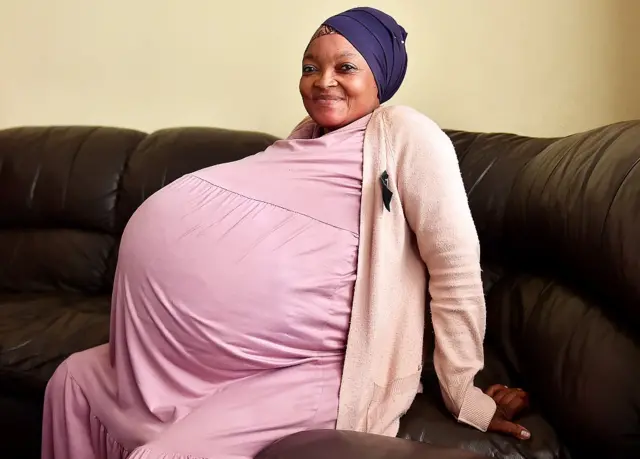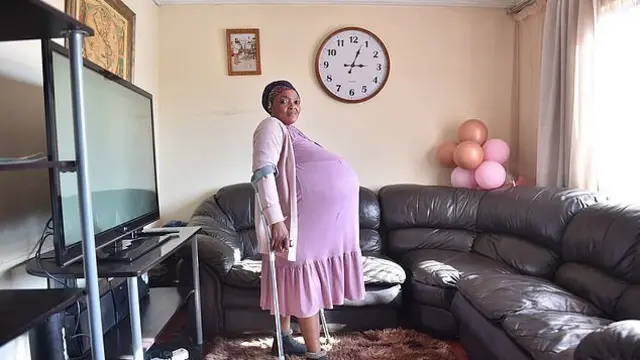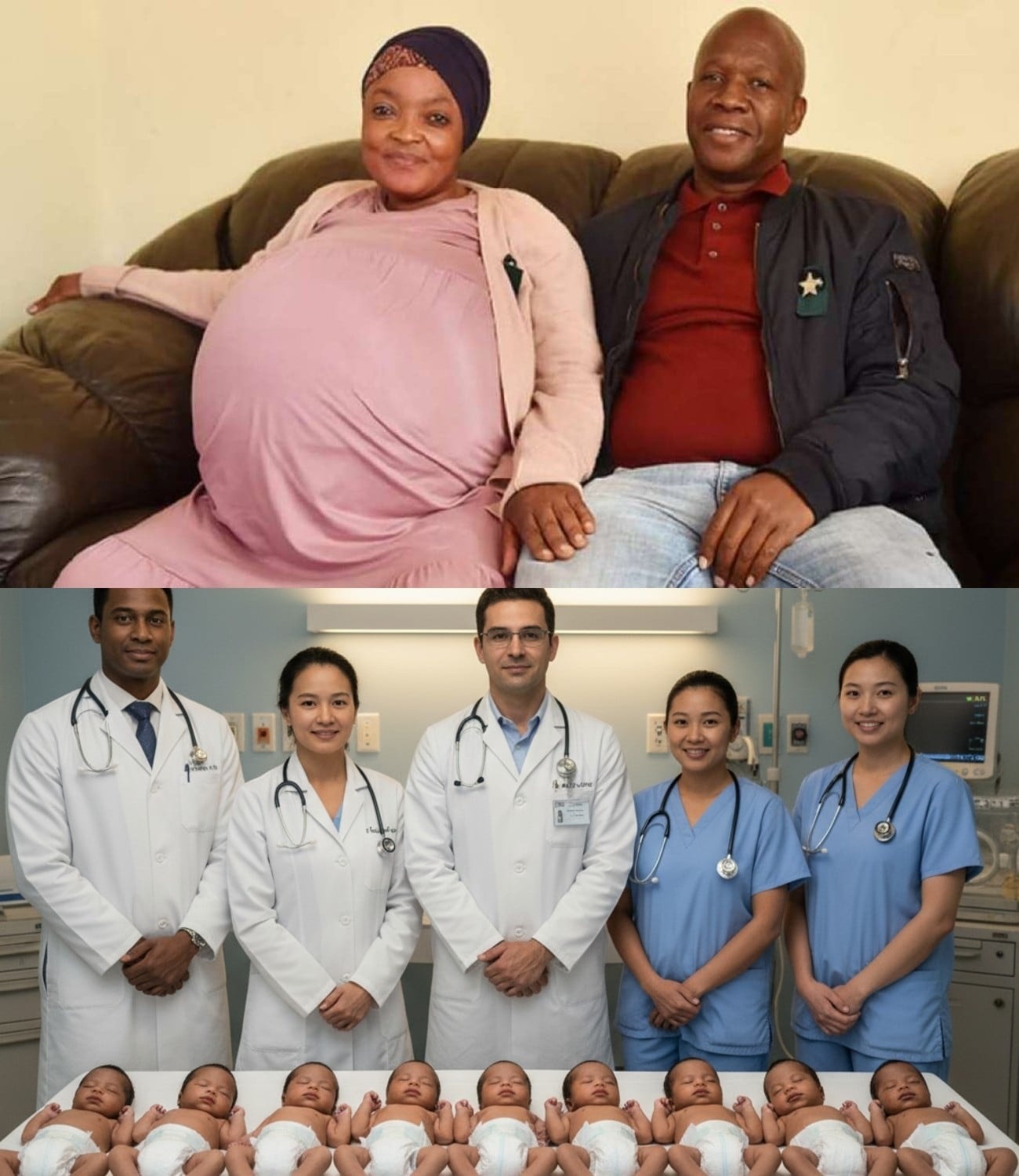Disclaimer: This article is based on verified information from reputable medical and news sources. It is intended for general informational purposes only and should not replace professional medical advice
A Remarkable Birth Story: A Mother Welcomes Ten Babies, Inspiring Global Conversation on Medical Rarity
In an extraordinary medical event that drew worldwide attention, a woman recently gave birth to ten babies in a single delivery. The story has sparked widespread discussion about human fertility, medical care, and the complexities of multiple births. According to official hospital statements and medical experts, nine of the newborns are healthy and stable, while one presented an unexpected medical anomaly that has since been closely examined by specialists.
This remarkable case has been confirmed by hospital representatives and reported through credible health and news outlets, who emphasized that such births are extremely rare but not without precedent. Medical professionals have used this moment to shed light on the science of multiple pregnancies and the importance of comprehensive prenatal care for mothers expecting multiples.

Understanding Multiple Births: How Do They Happen?
Multiple births—defined as the delivery of two or more babies during a single pregnancy—can occur naturally or through assisted reproductive technologies. According to data from the World Health Organization (WHO) and the Centers for Disease Control and Prevention (CDC), the global rate of multiple births has gradually increased over the past few decades, largely due to advances in fertility treatments such as in vitro fertilization (IVF) and improved maternal healthcare.
The human body is naturally designed to carry one child per pregnancy. However, in rare cases, a woman may release multiple eggs during ovulation, or a single fertilized egg may split into several embryos, resulting in twins, triplets, or even higher-order multiples. Deliveries involving more than eight babies are exceptionally rare, with only a handful of verified cases documented in modern medical history.

Medical Perspectives on High-Order Multiple Births
Delivering ten babies, medically referred to as decuplets, is an event that challenges even the most advanced healthcare systems. Specialists from the hospital involved in this case have confirmed that a large multidisciplinary team—including obstetricians, neonatologists, anesthesiologists, and nursing staff—worked together to ensure the safety of both the mother and her children.
According to the American College of Obstetricians and Gynecologists (ACOG), pregnancies involving multiple fetuses are considered high-risk due to the increased likelihood of premature birth, low birth weight, and developmental complications. Intensive prenatal monitoring, nutritional support, and early intervention are critical for improving outcomes in such complex pregnancies.
Dr. Maria Thompson, a maternal-fetal medicine specialist who has studied multiple pregnancies for over two decades, explained in an interview with a medical journal that cases like this highlight both the power and the limits of modern medicine. “The successful delivery of so many babies is a testament to the skill and coordination of the healthcare team,” she said. “Each baby requires individual care and attention in the neonatal intensive care unit (NICU) to ensure healthy development in the early weeks of life.”

The Role of Prenatal Care and Nutrition
Experts emphasize that prenatal care plays a vital role in determining the health of both mother and babies in any pregnancy, but especially in high-order multiples. Regular medical checkups allow doctors to monitor fetal growth, detect potential complications, and plan for specialized delivery procedures if necessary.
The World Health Organization recommends at least eight prenatal visits during pregnancy to reduce health risks. For mothers carrying multiple babies, even more frequent monitoring may be required. Proper nutrition, adequate rest, and medical supervision can significantly improve birth outcomes and postnatal recovery.
Nutritional experts also point out that women expecting multiple children have higher caloric and nutrient needs. Protein, iron, calcium, and folic acid are essential to support fetal growth and maternal health. Healthcare providers often prescribe prenatal vitamins and dietary supplements to meet these increased demands.
Understanding Congenital Anomalies
In this particular case, hospital officials clarified that one of the ten babies was born with a rare congenital anomaly—a condition that can occur due to genetic or developmental factors during pregnancy. While the details have not been publicly disclosed for privacy reasons, medical staff have assured that the finding was handled with professional care and ethical sensitivity.
Congenital anomalies, sometimes referred to as birth defects, are structural or functional differences present at birth. According to the World Health Organization, approximately 3–6% of newborns worldwide are affected by such conditions. These may range from mild to severe and can involve various parts of the body, including the heart, limbs, or organs.
Most congenital anomalies are not preventable, though certain steps—such as avoiding harmful substances, ensuring proper nutrition, and maintaining regular prenatal visits—can help reduce risks. Healthcare teams around the world continue to research early diagnostic techniques and improved treatments for these conditions.

Global Reactions and Ethical Considerations
The news of the mother delivering ten babies quickly circulated on social media and global news platforms. While public fascination is understandable, medical professionals caution against sensationalizing such events or spreading misinformation.
Ethical medical reporting requires that all information be verified through reputable sources and that patient privacy be respected. In this case, the hospital and family have requested confidentiality, focusing instead on the well-being and development of the newborns.
Experts from the International Federation of Gynecology and Obstetrics (FIGO) emphasize the importance of respecting family boundaries and understanding the emotional and physical demands of multiple pregnancies. Families in similar situations often require not only medical support but also emotional counseling and community assistance to adjust to their new circumstances.
The Family’s Journey and Ongoing Care
Hospital representatives have confirmed that both the mother and her nine healthy babies are receiving continued medical supervision. The healthcare team remains closely involved in ensuring that all ten newborns—each with unique needs—receive optimal care in their early stages of life.
Neonatal care for premature or low-birth-weight babies typically includes temperature regulation, respiratory support, nutritional monitoring, and infection prevention. Specialized NICU teams are trained to handle these challenges with precision and compassion.
The family expressed deep gratitude for the professionalism and dedication of the medical staff. Their story serves as an inspiration, showcasing both human resilience and the achievements of modern medicine.

Lessons from an Extraordinary Birth
This extraordinary event serves as a reminder of how far medical science has advanced in supporting high-risk pregnancies and premature infants. It also highlights the importance of public awareness about maternal health, access to quality prenatal care, and continued medical research on rare conditions.
For the medical community, such cases offer valuable data for studying the biological limits of human pregnancy and improving neonatal survival rates. For families and the public, they reinforce the importance of trust in healthcare systems and the shared hope for healthy beginnings.
Conclusion
The story of a mother giving birth to ten babies—nine healthy and one with a rare medical condition—stands as a testament to medical expertise, family courage, and the power of community support. Verified through hospital sources and supported by established health organizations, it reflects not only an exceptional medical milestone but also a call to promote maternal health education and responsible reporting.
As the family continues their recovery and adaptation, their experience inspires ongoing conversations about science, compassion, and the miracles of life.
